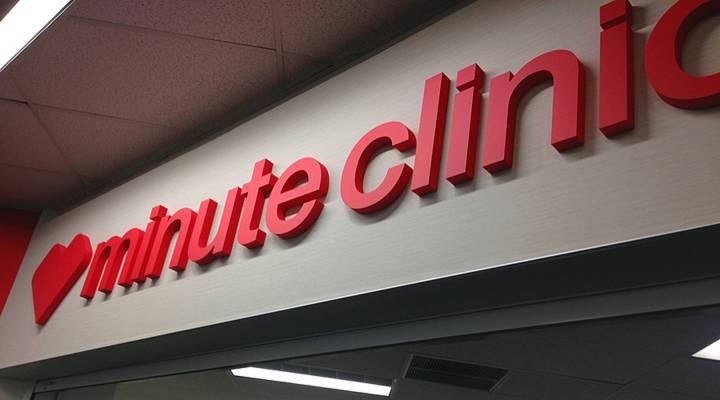
What the merger of CVS and Aetna could mean for customers

When child care worker Kimberly Nunez woke up one morning with her eye swollen from a sty, she called her doctor.
“The doctor wasn’t in that day,” she recalled. “When I called they just told me to go to urgent care or somewhere where they could handle it.”
Nunez decided her best option was a CVS MinuteClinic in Philadelphia.
“No calling, no nothing. Easy. It’s very convenient. It’s always a second option,” she said.
CVS is hoping its latest move will make it a first option for more consumers.
In early December the pharmacy chain announced a $69 billion deal to buy health insurance giant Aetna. With this new acquisition, the company wants to build on its MinuteClinics by creating what the company calls health care hubs, where people like Nunez can get even more of their basic needs met, including services for vision and hearing.
Retail clinics started sprouting up more than 15 years ago. Walgreens and the grocery chain Kroger’s each have several hundred, but CVS dominates the market with 1,100 clinics.
With weekend as well as weekday hours and an average charge of $80, CVS says it handles 5 million appointments a year, often to treat simple problems like ear infections, the flu and routine lab tests for diabetes or high blood pressure.
But here’s the big problem with MinuteClinics — they often do not save consumers money.
“We found that the majority of visits did not represent replacement of an emergency department visit, or doctor’s office visit,” said Dr. Ateev Mehrotra, a health policy professor at Harvard Medical School.
“What does that mean? It means people who otherwise would have been at home, with their cold, and they had chicken soup, now they are going and getting care,” Mehrotra said.
Bottom line, Mehrotra said people end up spending more money because they go to the MinuteClinic and to the doctor’s office.
CVS wants to change that. By buying Aetna, CVS would have 47 million Aetna customers it can nudge into getting more of their care in the clinics with incentives like no co-pays to treat sinus infections.
| CVS might become your new doctor |
| CVS-Aetna merger would help the drugstore take on Amazon |
| The Cigna CEO on what happens when health care is politicized |
But CVS is dreaming even bigger. Chief Medical Officer Troyen Brennan said the company hopes its stores will become “the front door” of the U.S. health care system. A place, he said, where people can be fitted for glasses, have their hearing tested, or buy a walker.
“What we want to do is begin to convert the stores over time, but relatively rapidly, into places where people can get concierge services related to their health so we have a full picture of their health care and we can help guide them,” Brennan said.
CVS has also set its sights on a health care goldmine, the people with chronic conditions who are responsible for 80 percent of health care spending. CVS can make more money controlling diabetes than treating a sore throat. But these patients often have long-term relationships with their specialists which they want to maintain, said Dr. Allan Khoury, a consultant with Willis Towers Watson.
“For this to work, patients need to be assured that the information they divulge at a MinuteClinic is available to their doctors,” he said. These patients must trust the clinic is an extension of the doctor’s office where patient records are accessible and care is coordinated, Khoury said.
To do that, CVS must convince providers to share that data, but if they do, doctors and hospitals are effectively allowing a slice of their business to walk out the door.
“Relationships need to be built. Contracts need to be put in place,” acknowledged Khoury.
With Aetna in the fold, CVS has more of an advantage, namely the insurer’s 47 million patients who can be dangled as leverage to negotiate some kind of deal with the doctors and hospitals.
But hospitals and doctors still might not want to play ball.
There’s a lot happening in the world. Through it all, Marketplace is here for you.
You rely on Marketplace to break down the world’s events and tell you how it affects you in a fact-based, approachable way. We rely on your financial support to keep making that possible.
Your donation today powers the independent journalism that you rely on. For just $5/month, you can help sustain Marketplace so we can keep reporting on the things that matter to you.


















